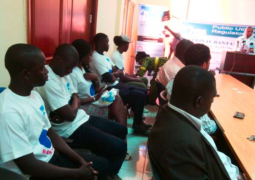The Gambia’s gross domestic product (GDP) is projected to surge to about 10 per cent in 2013, if the projected further rebound in agriculture towards this date does not waver.
GDP is the monetary value of all the finished goods and services produced within a country’s borders in a specific time period, usually calculated on an annual basis.
An IMF mission to the country led by its Mission Chief for The Gambia David Dunn, told journalists at a press briefing held yesterday at the conference room of the Ministry of Finance and Economic Affairs that this surge in GDP is anticipated due to the expected rebound in agriculture and the good outlook of the country’s tourism towards 2013.
“Based on projected further rebound in agriculture in 2013, which anticipates that crop production will have fully recovered to pre-drought levels, real GDP growth could surge to about 10 per cent next year, before returning to its longer-term trend of about 5.5 per cent a year over the medium term, Mr Dunn told the media after meeting with Minister of Finance and Economic Affairs Abdou Kolley, Governor of the Central Bank of The Gambia Amadou Colley, and other senior officials, as well as with representatives of the private sector, civil society, and development partners, from 5 to 18 September this year.
There are downside risks to this outlook, as well as greater upside potential, the IMF mission chief said, adding: “In particular, the possibility of prolonged weaknesses in the global economy or strong shocks to food and fuel prices could dampen growth in key sectors of the Gambian economy.
“At the same time, sound macroeconomic policies combined with a structural agenda that seeks to promote productive private sector investment in infrastructure – as envisaged in the authorities’ Programme for Accelerated Growth and Employment (PAGE) – could boost longer-term growth trends.”
Mr Dunn also mentioned that strengthening The Gambia’s relations with the regional and international communities would be important for building confidence in the economy and generating greater support from development partners for PAGE priorities.
The Gambia’s debt burden
The IMF mission chief said further that the government has taken some initial steps towards addressing its “heavy” debt burden.
“During the first half of 2012, Government’s net domestic borrowing (NDB) was reduced to 1.2 per cent of annual GDP, compared with 2.3 per cent of annual real GDP during the same period in 2011,” Mr Dunn said. “Moreover, the Government remains committed to ceilings on NBD of 2.5 per cent of GDP for 2012 as a whole and 1 per cent of GDP in 2013.”
By easing pressure on the domestic financial market and T-bills yields, it is projected that government’s interest payments on domestic debt relative to its revenues would fall from 18.5 per cent in 2011, to 18 per cent in 2012, to just under 15.5 per cent in 2013.
Mr Dunn added that updated external debt indicators also show “progress has been made” towards reducing The Gambia’s debt vulnerability.
Taxation
“In line with commitments to ECOWAS (Economic Community of West African States) the Government is committed to replacing the general sales tax with value added tax (VAT) on January 1, 2013, which is expected to lead to a boost in revenue collections,” Mr Dunn disclosed.
He added that beyond the VAT, the government seeks to pursue a comprehensive tax reform that “broadens” the tax base, “simplifies” procedures, and “lowers” tax rates, while preserving revenues.
“However,” Mr Dunn noted, “fuel subsidies continue to cut into potential tax revenues, as little progress has been achieved toward eliminating them despite monthly price adjustments.”
Banking sector
Growth of credit to the private sector and deposits in commercial banks “have slowed considerably” in 2012, according to the IMF mission chief.
He said that In May, with inflation pressures contained, the Central Bank of The Gambia (CBG) acted to ease its monetary policy stance by reducing the reserve requirement on deposits by two percentage point (to 10 per cent).
“Also, the CBG continues to strengthen banking supervision,” he said. “In preparation for the upcoming increase in the minimum capital requirement at the end of 2012, the CBG has reviewed banks’ plans for meeting the new requirement and stands ready to strictly enforce the new measure.”
In conclusion, Mr Dunn, whose Mission discussed The Gambia’s performance under its macroeconomic and financial programme supported by the IMF under its Extended Credit Facility (ECF), said preliminary data indicate that “all performance criteria for the first review of the new ECF-supported programme were met”.



